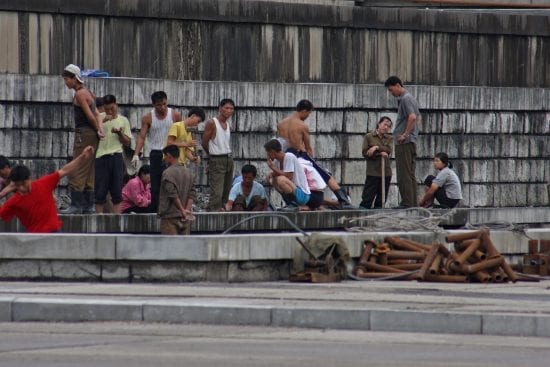
State-sponsored Slavery: a North Korean Export
The Global Slavery Index reports that over one million North Koreans are estimated to be in modern-day slavery. Of those, approximately 100,000 to 200,000 work internationally, performing slave labor for the Kim regime.
North Korea has exported forced labor for decades, but the practice has increased under Kim Jong-un, who came into power in 2012. It is estimated that North Korean workers are employed in 45 countries throughout Asia, Africa, the Middle East, and Europe. Working primarily in construction, mining, logging and textiles, the laborers endure long hours, poor conditions, and constant – though sometimes covert – oversight from government authorities. North Korean workers are known to have died from working conditions in Russia, Poland, and Qatar, among others. In compensation for their stressful manual labor, workers receive approximately only 10 to 20 percent of their wages; North Korea is believed to generate up to $2.3 billion, by some estimates, through this exploitative practice. The income serves to circumvent economic isolation stemming from North Korea’s nuclear program and provides the regime with a cash flow to sustain itself. To prevent defection, workers are heavily vetted prior to international placement. Michael Glendinning of the European Alliance for Human Rights in North Korea explains, “They only select workers who are married and have children – hostage-taking essentially”; if a family member were to defect, the government could inflict punishment on its loved ones at home.
Russia and China are home to the most North Korean workers. A 2016 report by the Data Base Center for North Korean Human Rights estimated that there are 50,000 North Korean laborers in Russia, providing $120 million to the state. North Korean slave labor has a substantial presence in Russia’s construction and logging sectors, contributing to World Cup stadiums, Moscow skyscrapers, and Siberia’s timber industry. In China, North Korean workers labor in factories, process seafood, and fill labor gaps. An AP investigation in 2017 found that seafood processed by North Korean slave labor was distributed in U.S. markets, despite federal law prohibiting this practice.
In the Gulf States, approximately 6,000 North Korean workers labor in slave-like conditions. It is estimated that 2,500 work in Kuwait, 1,500 in the United Arab Emirates (UAE), and 2,000 in Qatar. North Koreans have been known to work on World Cup stadiums in Qatar, in state-sponsored – and mostly empty – North Korean restaurants in Dubai and Abu Dhabi, and even on expansion of the UAE’s Al-Dhafra Air Base, which is home to U.S. troops. In recent years, due to labor abuses and international pressure, Oman and Qatar have expelled some North Korean workers and Kuwait, Qatar, and the UAE have stopped issuing worker visas, but North Korean state-sponsored slave labor continues to pervade the construction sector in the region. North Korean workers are isolated, suffer physical abuse, work long hours with little rest, and are under constant surveillance. Further, the AP reports that it is common for eight North Koreans laborers to live together in a 69-square foot apartment with little food and resources.
The European Union has also been a destination for North Korea’s unique brand of modern-day slavery. The Wall Street Journal reports that for decades, North Koreans worked in Bulgaria, Czech Republic, Malta, Poland, and other nations; however, changes in EU policy and international sanctions have mostly ended the practice. Poland was one of the last states to end its use of North Korean labor, though workers can remain until their visas expire. The Polish State Labor Inspectorate estimates that 450 North Korean laborers remained in the country in mid-2017 working for at least 19 companies in industries such as shipbuilding and agriculture. In Polish shipyards, North Korean laborers worked on warships belonging to NATO members.
While North Korean workers are victims of modern-day slavery, exploited, and poorly treated in international postings around the world, they are often in better conditions – and receive better pay – than their fellow citizens at home.
Photo courtesy of Roman Harak/Wikimedia Commons.
